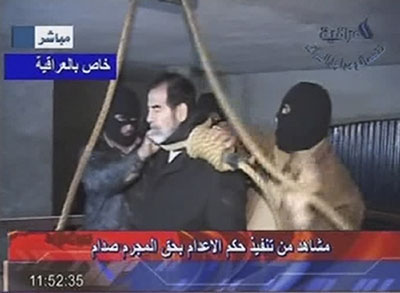Timing of Saddam execution risks Arab backlash
(AFP)Updated: 2006-12-31 13:56
|
|
Even the West's leading Middle East allies, Egypt and Saudi Arabia, publicly spoke out against the choice of the first day of the Muslim Feast of Sacrifice to put Saddam to death.
The ousted strongman was executed in Baghdad at dawn on Saturday as Muslims began celebrating the Eid al-Adha in which a sheep is traditionally slaughtered in memory of Abraham, who according to the Koran, was about to sacrifice his son Ismail on God's orders, but was sent a sheep instead.
Grainy footage of a grey-bearded and calm-looking Saddam being prepared for the gallows was aired on Iraqi state television and re-broadcast across the Arab world.
"Saddam was being dragged away like he was the sheep waiting to be slaughtered," said Emad Gad, researcher with the Cairo-based Ahram Centre for Strategic Studies.
"The main issue here is that the execution took place on the morning of the Eid al-Adha," Gad told AFP. "This will stir anger and humiliation in people, whether they supported him or not.
"Generally in the region, people's emotions are already anti-US, and these images will add to that feeling," he warned.
The executive editor of the Dubai-based Al-Arabiya news channel, Nabil Khatib, agreed.
"The pictures will re-create the anger and frustration among a large part of the Arab masses," Khatib told AFP.
"Once more, ordinary Arabs felt that there is a conspiracy against their symbols."
The newsman said the impression was all the greater because Saddam was not the demon to Arab public opinion that he had become in the West.
The ousted Iraqi president had successfully projected himself among ordinary Arabs as the one leader in the region "who confronted external threats on behalf of the Arabs ... who fought Iran and launched missiles at Israel," Khatib said.
Samer Hamzeh, news consultant for state-run Dubai Media Incorporated which groups Dubai Television and three other channels, warned that the graphic footage of the erstwhile Arab hero being led to the gallows risked sparking a violent backlash.
"This is not our daily news picture. It is a historic, very emotional picture ... and the effect of emotional pictures does not show right away," he said.
Hamzeh said the fact that Saddam looked composed as he was readied for execution would not diminish the negative impact of the footage.
"It is not about his behaviour. The normal viewer will see the picture as humiliating," he argued. "Humiliation can provoke anger, violence."
Egypt, the biggest recipient of US aid after Iraq and Israel, openly criticised the choice of execution date and voiced concern it might stoke further violence inside Iraq.
"Egypt regrets the fact that the Iraqi authorities carried out the execution of former Iraqi President Saddam Hussein, and that it took place on the first day of Eid al-Adha," foreign ministry spokesman Alaa al-Hadidi told the official MENA agency.
The timing of the execution "did not take into consideration the feelings of Muslims and the sanctity of this day which represents amnesty and forgiveness," Hadidi said.
"We hope that the execution of the former president at this time... will not lead to more deterioration in the situation and inflame the spirit of revenge, instead of efforts to ensure Iraqi unity."
The Saudi official media voiced similar criticism.
"There has been a feeling of surprise and dismay that the implementation of the (death) sentence (against the former Iraqi president) came ... on the first day of Eid al-Adha during which... Muslims come together," said a commentary carried by the official Saudi Press Agency.
|
||
|
||
|
|


